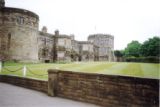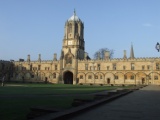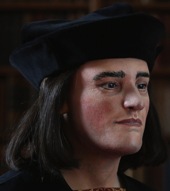There is more happening in the UK than the Queen’s Diamond Jubilee and the Olympics later in the (northern hemisphere) summer.
 This coming weekend, the Red Wyvern Society will hold a medieval event of ‘Living History at Skipton Castle’, North Yorkshire, 2 to 4 June 2012. This historical re-enactment society usually portrays the Clifford household, who were Lords of Westmorland and Craven. The venue, Skipton Castle, belonged to the Clifford family, but for ten years it belonged to Richard, duke of Gloucester, later Richard III, before it was returned to the Cliffords after 1485.
This coming weekend, the Red Wyvern Society will hold a medieval event of ‘Living History at Skipton Castle’, North Yorkshire, 2 to 4 June 2012. This historical re-enactment society usually portrays the Clifford household, who were Lords of Westmorland and Craven. The venue, Skipton Castle, belonged to the Clifford family, but for ten years it belonged to Richard, duke of Gloucester, later Richard III, before it was returned to the Cliffords after 1485.
The event is set to include many aspects of medieval life, including arms and armour, there is a trebuchet, there is a ‘Knight School’ and ‘Dinner is served’ at 14h00. Members of the public will be able to mingle with medieval people, see and handle reproductions of medieval equipment and take part in some of the demonstrations. To view the full programme, click here.
The following weekend, there is a two day academic symposium at Wingfield, Suffolk, ‘1362: Celebrating 650 years of Wingfield Church and College’, on 9 and 10 June 2012. The aim is to celebrate the 650th anniversary of the foundation of Wingfield Church and College and explore the history of Wingfield, Sir John Wingfield, and the de la Poles.
Richard III’s sister, Elizabeth, duchess of Suffolk, is buried in Wingfield church together with her husband, John de la Pole, duke of Suffolk. Their son, John de la Pole, earl of Lincoln, was Richard’s heir presumptive after the death of Richard’s son, and was probably born at nearby Wingfield Castle.
The speakers are all well-known, including Dr Rowena E. Archer, Sally Badham, Professor Mark Bailey, Professor Eamon Duffy, Dr John Goodall, Dr Robert Liddiard, Edward Martin, and Professor Diarmaid MacCulloch. Dr Archer will be talking about the always fascinating Alice Chaucer; and Dr Goodall, whom we know as the author of The English Castle: 1066-1650 and God’s House at Ewelme, will concentrate on the architecture of Wingfield. The complete programme can be viewed here.
Unfortunately we just missed a weekend of Anglo Saxon activities, ‘Hands on Saxon’, which took place in Verlamium Park in St Albans, Hertfordshire, 26 and 27 May 2012. The reason for the event was to commemorate the 1,000th anniversary of the first written recorded use of the word “Hertfordshire” in the Anglo Saxon Chronicle. In 1012 the town had approx. 500 inhabitants. It was dominated by the Saxon Abbey and three churches marked its boundaries, St Michael’s in the west, St Peter’s in the North and St Stephen’s in the South.
1000 years later, some 4,000 people enjoyed historical displays depicting Saxon times, discovering what people wore, how they cooked and what their homes were like. You can read a review here.
The above photograph shows Skipton Castle (© Dorothea Preis)
Tags: Contemporaries, Medieval Life, Richard III







